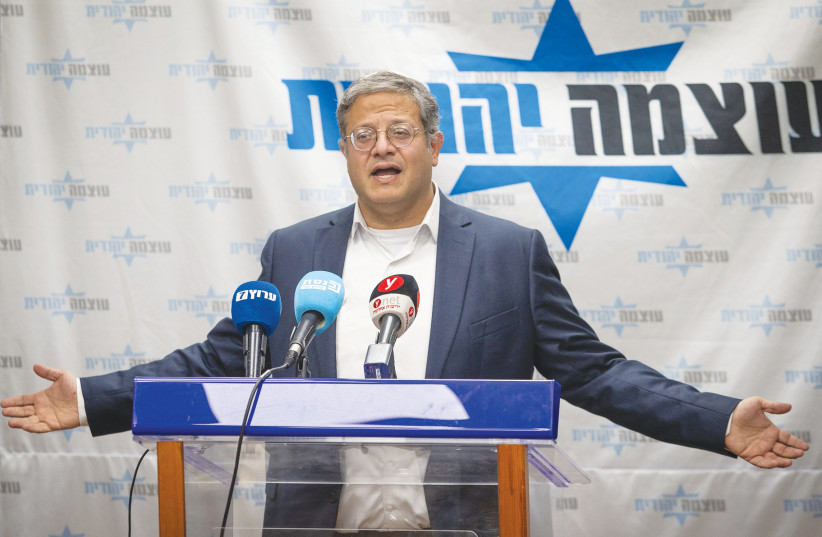An anti-war protest organized by a broad coalition of Israeli left-wing organizations in the heart of Tel Aviv was canceled after police denied the event a permit.
Organizers say they will appeal the denial to the Supreme Court and make plans for an even bigger event next week. The rally, and its cancellation, illustrate cracks in Israelis’ support for the war as well as what peace groups have called a chilling of left-wing activism.
“We were supposed to have, tonight, a big rally and demonstrations in Tel Aviv under the name that only peace can bring security, and calling out for Israeli-Palestinian peace,” said Rula Daood, national co-director of Standing Together, one of the rally’s lead organizers, along with Women Wage Peace and 20 other human rights groups.
Daood told the Jewish Telegraphic Agency that police greenlit the rally earlier in the week, only to revoke that permission later on. According to Haaretz, police denied the permit on the grounds that the rally’s location, at HaBima Square in central Tel Aviv, increased the likelihood of violence breaking out.
“They said that us having a demonstration that talks about peace will only bring chaos and incitement to violence in the streets of Tel Aviv,” she said.

Antiwar rally in Haifa planned for Saturday, permit has been denied
An antiwar demonstration in Haifa is planned for Saturday, though police have also denied a permit for that gathering.
Since the fighting began with Hamas’ invasion on Oct. 7, Israeli officials have tussled over whether to allow any protest against the war. In the days following Oct. 7, dozens of Arab Israelis were arrested or suspended from university for alleged support of Hamas or its invasion of Israel.
Itamar Ben-Gvir, the far-right national security minister, supports a ban on all antiwar protests, and in early November, Israel’s Supreme Court upheld a ban on protests in two Arab-Israeli cities. Police later questioned three former Arab-Israeli lawmakers over plans to organize a protest in Nazareth, in northern Israel.
Days later, Israel’s first organized antiwar protest of several hundred people took place in a fenced-off area in a Tel Aviv park, after a Supreme Court hearing in which police allowed it to go forward.
This week, the Supreme Court issued an injunction saying that Ben-Gvir, who oversees the Israel Police, is not allowed to give police officers instructions during protests.
In response, Ben-Gvir criticized the injunction and Israel’s attorney general, with whom he has repeatedly clashed.
“Immediately after the slaughter on Oct. 7, I instructed the Israel Police to prevent protests identifying with the Nazis from Hamas,” he wrote on Facebook. “To my disappointment, the state prosecution forced the Israel Police to agree to these protests. This morning, the Supreme Court made an outrageous decision to deny me the authority to prevent support for the enemy at a time of war.”
Organizers from Standing Together suggested that the denial of their permit indicates that Ben-Gvir’s policy to prevent anti-war protests is still being heeded in spite of the injunction.
“He’s trying to make the police force also police his own point of view, that anything that talks about peace, or I think that criticizes the Israeli government action right now, is not welcomed,” said Daood.
The absence of large protests now is a stark contrast to the period before Oct. 7, when massive protests against the government’s proposed judicial overhaul dominated Israeli discourse and frequently filled major intersections. In this case, polls show that the vast majority of Jewish Israelis support Israel’s war effort against Hamas in Gaza, while Arab-Israeli opinion is mixed.
Still, Daood says that the Israeli left is drawing new members as Standing Together’s activities have grown to record levels in the last three months. The group has organized a series of gatherings across Israel post-Oct. 7, and drew audiences of hundreds to a recent series of events in the United States.
“Many people say that on October 7 people became more extreme and it is true that tons of people went more to the right, but also more people went to the left,” Daood said. “When you combine them all together, we’ve had thousands of people coming to our rallies talking about partnership and talking about a real peace and a ceasefire agreement.”
